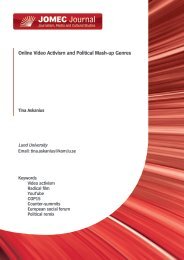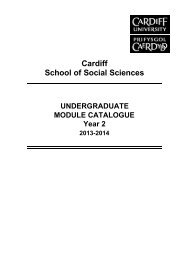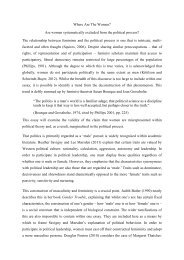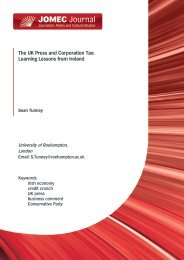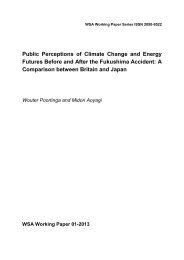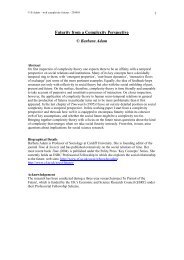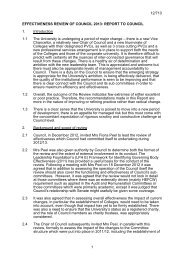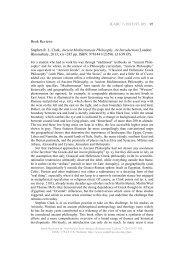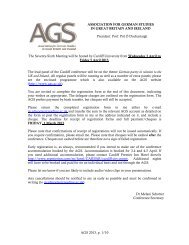APHRODITE IN PROCLUS' THEOLOGY - Cardiff University
APHRODITE IN PROCLUS' THEOLOGY - Cardiff University
APHRODITE IN PROCLUS' THEOLOGY - Cardiff University
You also want an ePaper? Increase the reach of your titles
YUMPU automatically turns print PDFs into web optimized ePapers that Google loves.
JLARC 3 (2009) 21-43 34<br />
enough for him to equate the demiurgy presented in the Timaeus with that of<br />
Homer. On the celestial level the demiurge whom Hephaestos obeys is Zeus, but<br />
on the cosmic level he chains Ares and Aphrodite paying obedience to Poseidon.<br />
Poseidon is the god whose will commands that terrestrial bonds should also be<br />
released, because he is the manager of the cycle of change and sees that all which<br />
is born will be destroyed and returned to a new beginning.<br />
The demiurge, whether celestial, like Zeus, or cosmic, like Poseidon, builds<br />
wholeness with the aid of opposing things and brings friendship to it through<br />
proportion, leading the deeds of Hephaestos, Ares, and Aphrodite to communion.<br />
Proclus usually favours a method of making divine principles into independent<br />
entities, but comes here closer to speaking on particular gods as different aspects<br />
of divinity:<br />
In Remp. 1.143,8-10: καὶ γεννῶν μὲν τὰς ἐναντιώσεις τῶν στοιχείων κατὰ τὸν ἐν<br />
ἑαυτῷ γεννᾶν Ἄρεα, φιλίαν δὲ μηχανώμενος κατὰ τὴν τῆς Ἀφροδίτης δύναμιν<br />
ἐνεργεῖν, συνδέων δὲ τοῖς Ἀρεϊκοῖς τὰ Ἀφροδίσια καὶ τὴν Ἡφαίστου τέχνην ἐν<br />
παραδείγματι προειληφέναι<br />
The demiurge produces opposites from itself according to Ares in himself, he<br />
establishes amity, acting on the power of Aphrodite and he joins Aphrodite and<br />
Ares because he has beforehand as a preexisting model the art of Hephaestos<br />
(translation mine).<br />
The demiurge is all things and acts with all the gods. The gods of the younger<br />
demiurgy imitate Zeus but their creations do not have the value of their father’s<br />
work because their creations are mortal things. In the Commentary on Timaeus<br />
Proclus deals with the same passage of the Odyssey, using an allegorical interpretation:<br />
“... thanks to this harmony and (ἀναλογία) proportion, first of all<br />
emerges (ταυτότης) identity and, following it, (ἕνωσις) unification.” 51<br />
This exegesis tells us that Hephaestos joins identity and otherness at the higher<br />
level, while at the lower level he joins harmony and division. Both of these pairs<br />
express communion and oppositeness, which theologians are used to talking about<br />
as Aphrodite and Ares. When Apollo, Hermes and the other gods see them in chains,<br />
they laugh and this laughter is also a demiurgic act, which, according to Proclus,<br />
provides a basis for cosmic things and gives power to their mutual bindings. In<br />
Commentary on the Republic Proclus provides a whole treatise dedicated to this<br />
divine laughter. 52 He explains mythical descriptions of the gods’ crying to signify<br />
their providence for the corruptible things, whereas the laughter of the gods is<br />
described as a mystical sign which refers to their activity on the universal and<br />
always in the same manner moving plentifulnesses of the world. 53<br />
51 In Tim. 2 27, 8-10.<br />
52 In Remp. 1. 126, 5-128, 4.<br />
53 In Remp. 1.128, 4-5.<br />
Tuomo Lankila, ‘Aphrodite in Proclus’ Theology,’ in: Journal for Late Antique Religion and<br />
Culture 3 (2009) 21-43; ISSN: 1754-517X; Website: http://www.cardiff.ac.uk/clarc/jlarc




